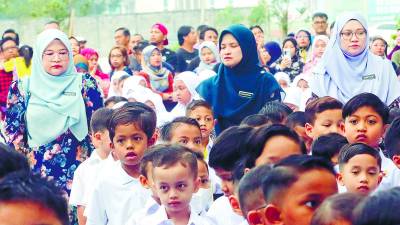PETALING JAYA: Amid rising concerns over early teacher retirements, the National Union of the Teaching Profession (NUTP) has urged the government to establish a special committee to study ways to make schools more conducive and free from excessive stress.
Its secretary-general Fouzi Singon said independent assessments of teachers’ emotional well-being should be carried out to accurately gauge stress levels among educators and students.
“NUTP is not convinced that teachers’ loss of interest is the main factor behind early retirements.
“Instead, many senior teachers had expressed willingness to continue teaching if they were not burdened with irrelevant clerical work and digitalisation tasks, which have little impact on student performance,” he told theSun.
Fouzi said low-impact programmes and unresolved issues such as exam invigilation allowances and the absence of promised assistant teachers have further added to frustration.
He also raised concerns over the quality of newly recruited teachers, warning that mass intake without proper screening could affect future standards.
“The increase in trainee recruitment will only take effect after five years, which is not enough, and mismatched postings are creating more challenges,” he said.
According to Fouzi, poor school management is another major factor pushing teachers to leave.
“Many administrators fail to act as good human resource managers. This creates emotional stress, and when teachers are unhappy, schools become unconducive,” he said.
He added that NUTP has received numerous complaints from teachers about pressure from school management, with some administrators described as lacking empathy and being undemocratic in handling staff matters.
“Such unprofessional and emotionally driven decisions have negatively affected both teachers and parents.
“In some cases, frustration has even resulted in public displays of protest through banners,” he said.
“However, with no effective mechanism in place to address these issues, many teachers have been left demoralised, contributing to the rising trend of early retirements.”
Meanwhile, Congress of Unions of Teachers in the Malaysian Education
Service secretary-general Azizie Hassan downplayed concerns of a crisis, saying the early retirement rate was only about 1% to 2% compared with the overall teaching workforce.
“Most teachers remain committed to their profession. However, if retirements continue at a higher rate, it could affect the teaching workforce in core and STEM subjects, particularly in rural schools where gaps in literacy and numeracy are more pronounced.”
Azizie said to retain teachers, greater support is needed in the form of digital infrastructure, special allowances for those serving in remote areas, mental health initiatives and continuous upskilling.
“The Education Ministry has moved in the right direction.
“However, policies on workload, career development and incentives should be reviewed while teacher recruitment is increased,” he said.
Malaysian Association for Education president Dr Mohd Majid Konting expressed a similar view, pointing out that the annual average of 5,594 early retirements from 2022 to 2024 represented only 1.34% of the teaching force, a level comparable to other professions.
He added that while teachers may face difficulties with policy implementation, policies themselves are necessary to guide the profession.
“Good policies should address classroom realities. The challenge is whether teachers and their leadership chain at central, state, district and school levels can understand and implement them strategically.”
Mohd Majid added that Malaysia must invest in continuous professional development to sustain a strong teaching workforce.
“If we believe teachers are sine qua non (essential) to education, then we must strengthen both pre-service training and ongoing professional development to ensure they remain effective and efficient throughout their careers.”
Azizie said to retain teachers, greater support is needed in the form of digital infrastructure, special allowances for those serving in remote areas, mental health initiatives and continuous upskilling. – Amirul Syafiq/theSun
